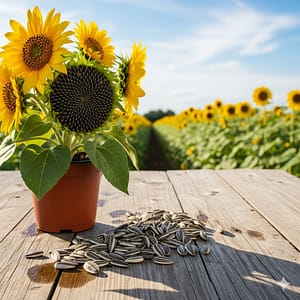- Home
- Sunflower Seeds

I. General Information
A. Scientific Name:
Helianthus annuus
B. Alternative Names:
Sunflower Kernels
C. Pronunciation:
/ˈsʌnˌflaʊər siːdz/
II. Sourcing and Origin
A. Source:
The edible seeds of the sunflower plant, which grow in the large flowering head.
B. Geographic Origin:
Native to North America.
C. Method of Processing:
Seeds are harvested from the sunflower head, then dried and de-shelled. They can be eaten raw or roasted, with or without salt.
III. Properties and Uses
A. Physical Properties:
Small, tear-shaped, typically black with white stripes when in the shell. The kernels are off-white and have a mild, nutty flavor.
B. Chemical Composition:
Excellent source of Vitamin E, magnesium, selenium, and healthy fats (polyunsaturated and monounsaturated). They are also a good source of protein and fiber.
C. Primary Uses:
Skincare: Sunflower oil is a popular carrier oil for essential oils and is used in many moisturizers due to its emollient properties.
Haircare: The nutrients in the seeds, particularly Vitamin E, are beneficial for scalp and hair health.
Wellness: Supports heart health, reduces inflammation, and provides antioxidants that protect against cellular damage.
Culinary: Used as a snack, in salads, as a garnish, in bread and baked goods, and ground into a butter.
Household: A very common type of bird food.
D. Key Benefits:
High in antioxidants, supports cardiovascular health, provides essential nutrients, and is a great source of plant-based protein.
IV. Safety and Considerations
A. Potential Allergies:
A common allergy, similar to other seeds and nuts.
B. Best Practices for Use:
Store in a cool, dark place or the refrigerator to prevent the oils from going rancid. Ground seeds should be used quickly.
C. Special Precautions:
High in calories, so consume in moderation if you are watching your weight.
V. Fun & Educational Facts
A. Historical Context:
Sunflower seeds were cultivated by Native Americans as a food source, for oil, and for medicinal purposes as early as 3000 B.C.
B. Did You Know?
A single sunflower head can contain up to 2,000 seeds.
C. DIY Recipe Idea:
Sunflower seed butter, roasted sunflower seeds with spices, sunflower seed brittle.
